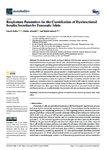Respiratory parameters for the classification of dysfunctional insulin secretion in pancreatic islets
| dc.contributor.author | Kabra, U | |
| dc.contributor.author | Affourtit, Charles | |
| dc.contributor.author | Jastroch, M | |
| dc.date.accessioned | 2021-06-21T09:11:44Z | |
| dc.date.issued | 2021-06-21 | |
| dc.identifier.issn | 2218-1989 | |
| dc.identifier.issn | 2218-1989 | |
| dc.identifier.other | 405 | |
| dc.identifier.uri | http://hdl.handle.net/10026.1/17264 | |
| dc.description.abstract |
<jats:p>The development of obesity and type 2 diabetes (T2D) has been associated with impaired mitochondrial function. In pancreatic beta (β) cells, mitochondrial energy metabolism plays a central role in triggering and controlling glucose-stimulated insulin secretion (GSIS). Here, we have explored whether mitochondrial bioenergetic parameters assessed with Seahorse extracellular flux technology can quantitatively predict insulin secretion. We metabolically stressed male C57BL/6 mice by high-fat feeding (HFD) and measured the glucose sensitivity of islet respiration and insulin secretion. The diet-induced obese (DIO) mice developed hyperinsulinemia, but no pathological secretory differences were apparent between isolated DIO and chow islets. Real-time extracellular flux analysis, however, revealed a lower respiratory sensitivity to glucose in DIO islets. Correlation of insulin secretion with respiratory parameters uncovers compromised insulin secretion in DIO islets by oxidative power. Normalization to increased insulin contents during DIO improves the quantitative relation between GSIS and respiration, allowing to classify dysfunctional properties of pancreatic insulin secretion, and thereby serving as valuable biomarker for pancreatic islet glucose responsiveness and health.</jats:p> | |
| dc.format.extent | 0-0 | |
| dc.format.medium | Electronic | |
| dc.language | en | |
| dc.language.iso | en | |
| dc.publisher | MDPI | |
| dc.subject | mitochondria | |
| dc.subject | bioenergetics | |
| dc.subject | glucose-stimulated insulin secretion | |
| dc.subject | pancreatic islets | |
| dc.subject | respiration | |
| dc.title | Respiratory parameters for the classification of dysfunctional insulin secretion in pancreatic islets | |
| dc.type | journal-article | |
| dc.type | Journal Article | |
| plymouth.author-url | https://www.webofscience.com/api/gateway?GWVersion=2&SrcApp=PARTNER_APP&SrcAuth=LinksAMR&KeyUT=WOS:000666142700001&DestLinkType=FullRecord&DestApp=ALL_WOS&UsrCustomerID=11bb513d99f797142bcfeffcc58ea008 | |
| plymouth.issue | 6 | |
| plymouth.volume | 11 | |
| plymouth.publisher-url | https://www.mdpi.com/2218-1989/11/6/405 | |
| plymouth.publication-status | Published online | |
| plymouth.journal | Metabolites | |
| dc.identifier.doi | 10.3390/metabo11060405 | |
| plymouth.organisational-group | /Plymouth | |
| plymouth.organisational-group | /Plymouth/Faculty of Health | |
| plymouth.organisational-group | /Plymouth/Faculty of Health/School of Biomedical Sciences | |
| plymouth.organisational-group | /Plymouth/REF 2021 Researchers by UoA | |
| plymouth.organisational-group | /Plymouth/REF 2021 Researchers by UoA/UoA01 Clinical Medicine | |
| plymouth.organisational-group | /Plymouth/Research Groups | |
| plymouth.organisational-group | /Plymouth/Research Groups/Institute of Translational and Stratified Medicine (ITSMED) | |
| plymouth.organisational-group | /Plymouth/Research Groups/Institute of Translational and Stratified Medicine (ITSMED)/CBR | |
| plymouth.organisational-group | /Plymouth/Users by role | |
| plymouth.organisational-group | /Plymouth/Users by role/Academics | |
| dc.publisher.place | Switzerland | |
| dcterms.dateAccepted | 2021-06-18 | |
| dc.rights.embargodate | 2021-6-22 | |
| dc.identifier.eissn | 2218-1989 | |
| dc.rights.embargoperiod | Not known | |
| rioxxterms.versionofrecord | 10.3390/metabo11060405 | |
| rioxxterms.licenseref.uri | http://www.rioxx.net/licenses/all-rights-reserved | |
| rioxxterms.licenseref.startdate | 2021-06-21 | |
| rioxxterms.type | Journal Article/Review | |
| plymouth.funder | Why do pancreatic beta cells waste energy?::MRC |


